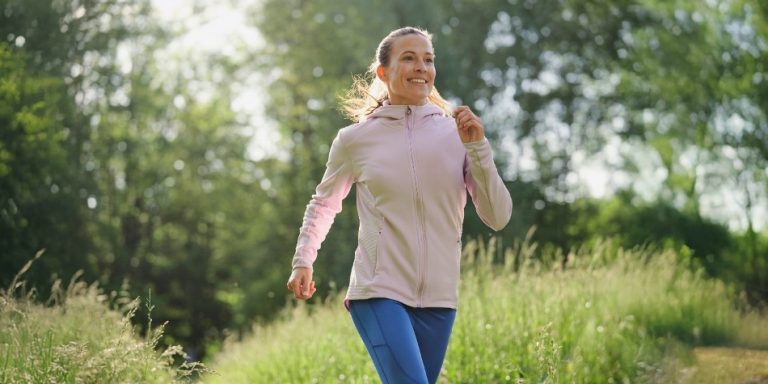
Longevity: how to live longer and preserve your health
Longevity means staying as healthy as possible for as long as possible. Longevity is becoming increasingly important as more and more people are living longer. Find out about the main principles and modern methods of achieving longevity.
Overview of topics
The main principles of longevity
Are how long we live and how we age determined by our genes? Yes and no. Our lifestyle also has a significant impact on the ageing process. Researchers believe that staying healthy as we age is more than 70% under our own control. Eating a balanced diet, getting plenty of exercise and sleeping well help the body stay healthy for longer. In the following, we set out the main principles for staying healthy as you age.
Experts distinguish between a person’s lifespan and their healthspan. Your lifespan is the time from when you are born until you die. Your healthspan covers the years of your life in which you are healthy.
Nutrition: the key to longevity
Most people are aware that eating a balanced, nutritious diet reduces the risk of many diseases. What’s less well-known is that what and how we eat also affects the ageing process. In the following, we describe a variety of diets and nutrients that could be important in this regard.
Inflammation is responsible for a variety of chronic illnesses that occur in older age, such as heart disease, diabetes and arthritis. Eating an anti-inflammatory diet boosts your immune system and helps your body fight inflammation. In this way, it helps you stay healthy as you age-
The same applies to plant-based diets (i.e. diets that focus on foods derived from plant sources). It is not necessary to do without animal products completely. Vegetarian and Mediterranean diets are also plant-based, for example. Plant-based diets are good for you because they are rich in fruit, vegetables, wholegrain products, beans and pulses. People who eat a plant-based diet have a reduced risk of developing a number of different illnesses that occur in older age such as heart disease, certain types of cancer and type 2 diabetes.
Antioxidants can support healthy ageing. These are nutrients with a protective effect. They prevent or slow the damage caused to your cells by “free radicals”, which are produced by the metabolism in your body and also by external factors such as UV exposure and cigarette smoke. Antioxidants neutralise free radicals, and in so doing may protect us from a variety of diseases such as arteriosclerosis, cardiovascular diseases, arthritis and cancer. They also slow the ageing of the skin. Antioxidants can mainly be found in fruit, vegetables and pulses. Salmon and crustaceans are also rich in antioxidants. A good rule of thumb is that the more colourful a food naturally is, the more antioxidants it generally contains.
There is no exact definition of this term, but it is used to refer to foods that people believe are beneficial to health. Most are fruit, vegetables, pulses, cereals or seeds from faraway countries, such as acai berries, matcha and spirulina. The hoped-for effects include boosting the immune system, slowing the ageing process and preventing age-related conditions such as cancer, cardiovascular diseases and diabetes. These effects on humans have not been scientifically proven. But since superfoods are rich in nutrients such as vitamins, minerals, trace elements and antioxidants, they support a balanced diet. It’s worth noting that many of our local plant-based foods also contain healthy nutrients, which means that you can also achieve a nutrient-rich diet by eating local foods.
Tip: the food pyramid published by the Swiss Society for Nutrition (SSN) is helpful for maintaining a healthy, balanced diet.
Staying healthy as you age doesn’t just depend on what you eat, but also how much and how often. Studies show that animals are healthier and often live longer when they eat less (calorie restriction). Neurodegenerative disorders, cardiovascular diseases and cancer occur less frequently. This is because restricting calories causes the body to break down and reuse waste products in the cells and organs. This is known as “autophagy”, and also happens in humans. Little research has been carried out into the long-term effects on human health and longevity, however. Fasting, i.e. deliberately abstaining from food for a certain amount of time, is a form of calorie restriction. This also includes intermittent fasting, which involves going without food for a number of days or hours.
Sometimes, even small changes in your diet can lead to big improvements. As in the case of Lukas Gschwind (51):
Diet in the blue zones
Blue zones are certain regions where people’s lifespans and health are above average. There are currently five such blue zones: Okinawa (Japan), Sardinia (Italy), the Nicoya Peninsula (Costa Rica), Ikaria (Greece) and Loma Linda (California, United States). The inhabitants of these blue zones have certain things in common that could explain their long, healthy lives, including their plant-based diets consisting of wholegrains, beans, potatoes, fresh vegetables and fruit. Many people living in the blue zones only eat meat once a week, and they do without sugar almost entirely. The residents of Okinawa also follow the 80% rule known as “hara hachi bu”, according to which they stop eating when they are 80% full. This rule helps maintain a balance between losing and gaining weight.
Many people take food supplements to improve their health and live longer. But what are the actual benefits of food supplements when it comes to longevity? As a general rule, a balanced diet provides your body with all the nutrients it needs. Food supplements are a good idea in certain cases, however. Vitamin D, for example, is particularly important in older age because your body produces less of it. Vegetarians, vegans and people who don’t eat a lot of fish stand to benefit from additional omega-3. Magnesium is important for muscles, nerves and the heart, which makes it good for people who are under stress or who do exercise. The benefits of food supplements containing antioxidants such as vitamin A, vitamin E and beta-carotene, on the other hand, have not been proven.
Exercise: enjoy a better, longer life
Exercise and sport are some of the most effective ways to ensure a long and healthy life. Regular exercise reduces the risk of a number of conditions including cardiovascular diseases, high blood pressure, type 2 diabetes and cancer. Studies also show that regular exercise has positive effects on a person’s immune system, mental health and sleep, as well as their ability to cope with stress, their quality of life and their general well-being. People who are physically active are much less likely to develop dementia or Alzheimer’s disease. But that’s not all. In some cases, sport can prolong a person’s lifespan. Doing endurance sports for 45 minutes, three times a week, increases the activity of the enzyme telomerase, which helps keep the body’s cells young.
But what qualifies as regular exercise? As a general rule, any exercise at all is better than none. Just 15 minutes of exercise a day reduces the risk of premature death by 14%. And the more exercise you do, the greater the positive impact will be on your health. The following recommendations apply to adults in Switzerland:
- At least 150 minutes of moderate endurance exercise a week, or 75 minutes of high-intensity exercise. Moderate endurance exercise includes swimming, aqua fitness, skiing, hiking, walking, yoga, Pilates, dance, gymnastics, and also everyday gardening or cycling. High-intensity endurance exercise includes jogging, competitive cycling, fitness training and muscle building, hillwalking, football, ski touring and snowshoeing.
- This should be complemented by strength training two or more times a week.
Your training should be as varied as possible, combining multiple different forms of exercise. This will improve your strength, endurance, balance and agility. Get some inspiration from our tips for getting more exercise in your daily life.
VO2max stands for volume (V), oxygen (O2) and maximum (max). A person’s VO2max value tells you how much oxygen they take in and use when at maximum performance. This is determined by means of a breath gas analysis. The higher the value, the greater the capacity for endurance sport.
Exercise in the blue zones
Regular exercise also contributes to the longevity of people living in the blue zones. But they’re not lifting weights or running marathons. Instead, they live in an environment that forces them to be constantly moving. They walk many miles a day, or do housework and gardening without technical equipment.
Mental health: positive thinking for a fulfilling life
Studies show that there is a strong link between our physical and mental health. Not only do mental health conditions impact our quality of life, but they may also be precursors to chronic conditions such as cardiovascular diseases, diabetes or cancer. On average, people with mental health problems die ten (or in some cases even twenty) years earlier than others. In other words, mental health is an important prerequisite for a long life. Feeling connected and part of a community is particularly important. Numerous studies have shown that people with strong social relationships are happier and live longer.
Social contact and meaningful lives in the blue zones
Social contact is a very important part of longevity in the blue zones. Inhabitants of those zones prioritise their families, keep ageing parents and grandparents nearby, commit to a single life partner and invest a lot of time in their children. In Okinawa, everyone over the age of five belongs to a “moai”. These are groups of five people who look after each other for their whole lives. They meet every day, and if anyone is missing, the others ask if everything’s OK.
Having a good reason to get out of bed in the morning is another factor behind longevity in the blue zones. Researchers believe that having a purpose in life and an optimistic outlook may increase life expectancy by up to seven years.
This overview shows you how you can improve your mental health:
- Contact: people with strong social connections are healthier and happier than those who keep to themselves.
- Volunteer work: volunteering boosts your well-being and is good for your mental health.
- Exercise: people who exercise regularly are happier. This is because exercise releases “happiness hormones”.
- Finding purpose in life: having a job or hobbies that you find interesting and that make you happy gives your life meaning. It is a source of contentment, which boosts your mental well-being.
- Sleep: sleep and mental health are closely linked. Sleep deprivation can lead to fluctuations in mood, irritability, anxiety and depression. Our sleep tips can help you get better sleep.
- Reduced stress: stress is harmful to your health, including your mental well-being. The potential consequences of stress include tension, agitation, difficulty concentrating, low mood, depression and burnout.
Experts differentiate between a person’s chronological age and their biological age. The latter is determined by the length of their telomeres. Telomeres are the protective caps on the ends of our chromosomes, and they get shorter every time our cells divide. Eventually, they get so short that they no longer provide any protection. At that point, the cells stop dividing or performing their function. This is part of the ageing process, and increases the risk of diseases such as Alzheimer’s and cancer. People with long telomeres are – biologically speaking – younger, have better life expectancy, and are at lower risk of age-related diseases. But what factors affect the rate at which telomeres shorten? According to the latest research, they are genetics, an unhealthy lifestyle and mental stress.
This means that stress is an important factor when it comes to staying healthy as you age. Develop concrete strategies for dealing with everyday stress. Some people find breathing techniques or mindfulness exercises such as meditation and progressive muscle relaxation helpful. Social relationships, staying active and doing exercise also combat stress. Try to relax regularly as you go about your daily life, whether it’s with yoga, a walk during your lunch break, or reading on the sofa. Doing nothing can also be very relaxing.
Conscious breathing is another way to reduce stress. Adults breathe somewhere between twelve and twenty times a minute. But anxiety and stress can leave us feeling like we’re gasping for air. Our breathing becomes more rapid and shallow, which means that less oxygen gets to our cells. The better we supply our cells with oxygen, however, the more effectively we can eliminate toxins from our body. Breathing properly is therefore crucial to our health. It can prevent or at least help alleviate many complaints.
Prevention and early detection
Fortunately, there are effective treatments available for many conditions. But it’s better for them to not develop at all, and a healthy lifestyle can help with this. Early detection also helps identify risks at an early stage, prevent diseases and extend the healthy years of a person’s life.
Medical check-ups, which are sometimes referred to as screenings, are an important part of prevention and early detection. They flag diseases at an early stage, and improve the chances of recovery. It is important to measure blood pressure, cholesterol and blood sugar, and also to screen for cancers such as breast, prostate, skin and bowel cancer as well as osteoporosis and glaucoma. Determining when it makes sense to undergo which screening depends in part on your age and gender, your family health history and your body weight. You should talk to your GP about this.
Modern diagnostic procedures such as medical genetic testing and biomarkers are also part of early detection. Genetic testing helps assess your personal risk of developing certain illnesses and identify hereditary diseases. It is only used in certain cases. The law specifies who may carry out genetic testing in Switzerland.
Biomarkers are measurable biological characteristics that help detect illnesses or measure the success of treatment. They include certain proteins, hormones and the typical characteristics of cells. But biomarkers can do even more than this. They make it possible to tailor treatment to patients and their biological and genetic characteristics. They also help monitor treatment and improve prognoses. This kind of personalised medicine plays an important part in staying healthy as you age.
Longevity: what the latest research says
Progress in the fields of medicine and technology is making a significant contribution to rising life expectancy and improved prospects for staying healthy as you age. A look at the research that is currently being carried out tells us that further developments are to be expected in the future. We will discuss some of them in the following.
Have you come across the term longevity more frequently recently? It’s less about preventing ageing, and more about helping people stay healthy as they age. Longevity is often used to refer to innovative, in many cases personalised approaches that help preserve health in older age and prolong life.
Targeted manipulation of human DNA has the potential to prevent certain hereditary diseases and halt ageing processes with genetic causes. One particularly important process in this regard is genome editing, which uses biological tools to make targeted changes to the genome (i.e. the totality of our genes). These tools include proteins and ribonucleic acid (RNA). CRISPR/Cas9 technology, also known as “gene scissors”, is currently most frequently used.
Illnesses progress differently in different people. Personalised medicine makes use of this fact by tailoring diagnosis and treatment to individual patients. It does this using a combination of genetics and epigenetics. Epigenetic diagnostics looks at an individual’s lifestyle such as diet, exercise and consumption of stimulants, as well as environmental factors, pre-existing conditions, operations and long-term medication. Genetic diagnostics adds information gathered from the family medical history, and potentially also genetic testing. Personalised medicine uses this data to draw up individual risk profiles as the basis for tailored treatments.
As people age, their cells stop dividing (they become “senescent”). Although they stop performing their function, they stay in the body and continue releasing substances. This contributes to inflammation and age-related diseases. This is where senolytics come in. Senolytics are a class of drugs that target and kill senescent cells in order to potentially prevent diseases. Research into senolytics is still in its infancy, however. Studies involving animals have shown that senolytics can slow age-related degeneration and prolong life, but it is not clear if these findings can be applied to humans.
AI is currently rapidly developing into an important cornerstone of our healthcare system. It also plays an important role in prevention and early detection. AI is used in a number of different diagnostic procedures, for example to detect skin cancer. It is also capable of identifying dementia and breast cancer at an early stage, and can analyse infants’ health data to assess their risk of obesity. By analysing individuals’ health data, AI can draw up tailored personal health plans with recommendations for leading a healthy lifestyle.
“Wearables” play an important role in this. Wearables are small computers that you wear on your body. They measure data such as your heart rate, blood pressure, sleep quality or calorie consumption, and analyse it via apps. The AI behind these wearables detects irregularities such as atrial fibrillation in order to provide an early warning of potential health issues.
The term biohacking essentially means nothing more than efforts to improve your own health. This includes all of the tips that we have given on this page. Grinder biohacking goes one step further. The goal of grinder biohacking is to improve human bodily functions using cybernetic equipment in the form of technological implants. This could involve incorporating electronic systems and digital amplifiers into the body in order to restore the ability to hear, see, talk or walk. Neural chips should make it possible to control bodily functions from the brain using digital commands in order to overcome the consequences of paraplegia. These kinds of technologies may play a role in mitigating the restrictions typically associated with age in the future.
Longevity: more than just a trend?
Pills, superfoods, oxygen therapy and cryochambers: the longevity industry is growing, and meeting with strong demand. But could longevity be more than just a trend? How realistic is the idea of living to 100 with your health intact, as many books on the subject promise?
Life expectancy in the West has been rising rapidly since the year 2000, and is expected to continue increasing in the future. Half of all babies born today will live to be 100 years old. So it’s not living a long time that’s difficult. The challenge is staying healthy and maintaining a good quality of life as you age. There are a lot of factors affecting success in this regard, and individual physical characteristics and environmental conditions play a role. Regular check-ups and a healthy lifestyle are also crucial, as is avoiding accidents. But it’s your mental health that’s particularly important. People who have a positive attitude to life and feel a sense of purpose and vitality stand a better chance of staying healthy as they age.
Longevity: ethical issues
Our desire to stay healthy for longer raises some important questions, two of which we will look at in more detail here.
In western countries, ageing is often seen as a flaw. This perspective is the driving force behind many of our efforts to circumvent the ageing process. However, various studies show that those who accept that they are getting older, with all of the restrictions that entails, feel subjectively healthy. As a result, experts support a new “culture of ageing”. For them, ageing well doesn’t mean doing everything you can to stop or even reverse the ageing process. It means learning to cope well with the changes associated with ageing.
Western countries are the main beneficiaries of medical and technological progress. But is it fair for only some of the world’s population to have the chance to lead a long and healthy life? Some researchers propose stopping certain research if new methods of diagnosis and treatment exacerbate healthcare inequality. Instead, they believe that research should focus on finding solutions that are available to everyone.
How to start your journey to longevity
The subject of longevity is multi-faceted and covers a number of different issues. This may make it difficult to find a place to start. We recommend focusing on the most important principles of longevity. Think about what you’re already doing well, and where you could do more. Perhaps you already make sure to eat a balanced diet but often feel stressed? Or you go for regular check-ups but don’t get enough exercise in your daily life? That’s where you should start. Feel free to take small steps at first, because even those can bring about significant changes in the long term. Take a look at our tips for getting more exercise in your daily life, read our “Ratgeber” guide to stress, or browse the information we provide on nutrition and medical check-ups. Our health consultation service would be happy to help you with any questions or concerns.

The expert provided the editorial team with advice and input for this article. Julia Pieh (doctorate in pharmacy and toxicology, pharmacist, naturopath) works in the Helsana Health Consultation Service.


Newsletter
Find out more about current health issues every month and get all the information you need about our attractive offers from all Helsana Group companies * delivered by e-mail to read whenever it suits you. Our newsletter is free of charge and you can sign up here:
We did not receive your information. Please try again later.
* The Helsana Group comprises Helsana Insurance Company Ltd, Helsana Supplementary Insurances Ltd and Helsana Accidents Ltd.
